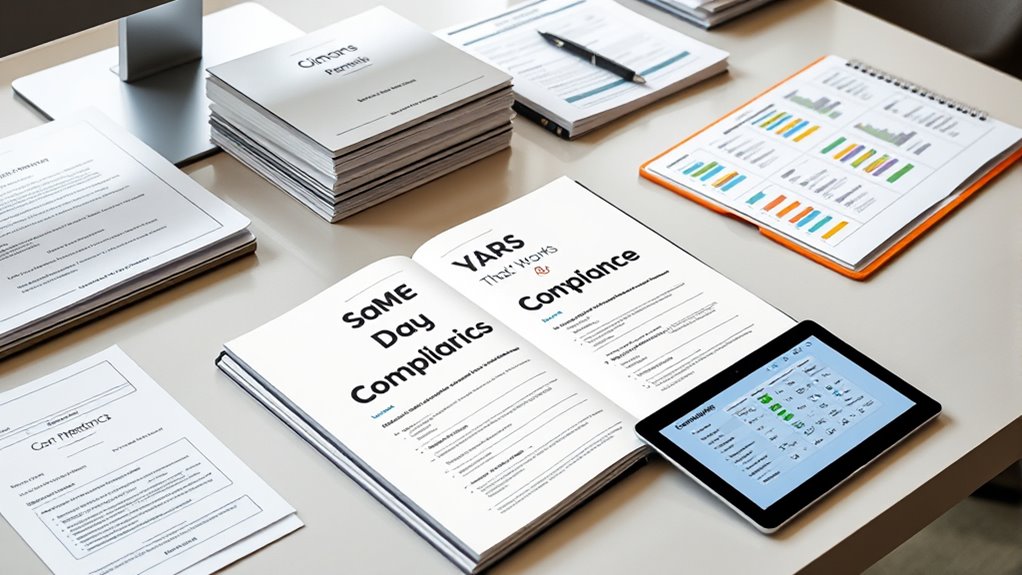To guarantee your same-day dough operation stays compliant, you must understand industry regulations, secure necessary permits, and maintain thorough documentation. Focus on verifying borrower identities, adhering to local zoning laws, and regularly updating compliance practices. Streamlining approval processes with automation and staying informed about code changes is also vital. If you keep these strategies in mind, you’ll be prepared for smooth and compliant operations—and there’s much more to discover if you continue exploring.
Key Takeaways
- Understand and stay updated on federal and state regulations to ensure quick turnaround loan compliance.
- Maintain thorough documentation, borrower verification, and accurate recordkeeping to support audit readiness.
- Streamline permit, licensing, and inspection processes to avoid operational delays and ensure legal compliance.
- Utilize automation tools and secure data management to enhance efficiency and protect sensitive information.
- Regularly review industry trends, regulatory updates, and case studies to optimize compliance strategies and improve processes.
Understanding Same Day Dough Regulations

Are you clear on the regulations that govern same day dough? Knowing these rules is vital to guarantee smooth loan approval processes. Regulatory guidelines set clear boundaries on how quickly you can access funding options, preventing fraud and ensuring financial transparency. Quick turnaround loans must meet specific criteria, including proper documentation and adherence to federal and state laws. Understanding these regulations helps you navigate the approval process efficiently, avoiding delays or penalties. It’s essential to stay updated on any changes that could impact your ability to secure funding swiftly. By mastering the regulatory landscape, you can optimize your funding options while remaining compliant. Additionally, awareness of industry-specific trends, such as viral commercial stars, can influence market perception and lending practices. This knowledge empowers you to make informed decisions and maintain trust with lenders and clients alike.
Key Compliance Requirements for Quick Turnaround

To guarantee quick turnaround loans remain compliant, you must prioritize key requirements such as thorough documentation, accurate borrower verification, and adherence to federal and state laws. Inspection protocols are essential to verify collateral and ensure proper valuation, preventing compliance issues. Regular compliance training keeps your team updated on evolving regulations and best practices, reducing errors. Accurate borrower verification, including identity checks and income assessments, is critical to avoid fraud and legal risks. Maintain detailed records of all transactions and communications to demonstrate compliance during audits. Staying current with inspection protocols and investing in ongoing compliance training ensures you meet regulatory standards efficiently. Additionally, understanding the importance of juice detox effects can help your team recognize potential health considerations that may impact borrower eligibility or financial decisions. These steps protect your operation and help you deliver fast, compliant loans consistently.
Essential Permits and Licensing Procedures

Understanding the permit application process is vital to getting your project off the ground quickly. You’ll also need to review licensing requirements to guarantee compliance with local regulations. By mastering these procedures, you can streamline approvals and avoid costly delays. Additionally, familiarizing yourself with license requirements specific to your project can further ensure a smooth process.
Permit Application Process
Charting the permit application process is a crucial step to guarantee your dough operation complies with local regulations and gets up and running smoothly. First, research the required permits and review their specific permit fees to budget accordingly. Complete all application forms accurately, ensuring you provide detailed information about your operation. After submission, stay proactive by monitoring the status of your application and preparing for inspection scheduling. Promptly respond to any requests for additional documentation or clarifications. Keep track of deadlines and maintain organized records of all correspondence. Once approved, verify that you’ve received all necessary permits before starting operations. Following these steps helps prevent delays and ensures your dough business remains compliant with local codes. Additionally, understanding the permitting process can streamline your approval timeline and avoid common pitfalls.
Licensing Requirements Overview
Once you’ve completed your permit application, it’s important to familiarize yourself with the specific licensing requirements that govern your dough operation. These requirements guarantee your business complies with local, state, and federal regulations. You’ll need to secure essential permits, such as health and safety licenses, before proceeding. During the licensing process, focus on streamlining loan approval to finance your setup and operations. Additionally, efficient customer onboarding is vital to meet compliance standards and ensure smooth transactions. Understanding licensing procedures helps prevent delays and penalties, keeping your business on track. Always stay updated on renewals and renew your licenses promptly. Being aware of toilet maintenance and repairs can help in ensuring your establishment maintains proper sanitation standards. By mastering these licensing requirements, you’ll lay a strong foundation for your dough business to operate legally and successfully.
Best Practices for Documentation and Recordkeeping

You need to keep accurate records of all transactions to stay compliant and avoid penalties. Make certain your data is stored securely to protect sensitive information. Proper documentation practices help streamline audits and ensure your business runs smoothly. Incorporating effective recordkeeping methods can further enhance your compliance efforts and operational efficiency.
Accurate Record Maintenance
Maintaining precise records is essential for ensuring compliance and smooth operations in dough coding. Accurate documentation supports inventory management and guarantees staff training aligns with best practices. To stay on top, regularly update logs, double-check entries, and verify data accuracy. Implement clear procedures for recording dough batches, ingredients, and expiration dates, reducing errors and discrepancies. Use the following table to keep key information organized:
| Record Type | Best Practice |
|---|---|
| Inventory Management | Track supplies daily; reconcile weekly |
| Staff Training | Document training sessions and certifications |
| Batch Records | Record production details immediately |
| Compliance Logs | Maintain up-to-date logs for audits |
| Quality Checks | Log inspections and corrective actions |
Consistent, accurate recordkeeping minimizes compliance risks and enhances operational efficiency. Proper recordkeeping helps ensure that all documentation is complete and accessible for audits and reviews.
Secure Data Storage
Secure data storage is critical for protecting sensitive information and ensuring compliance with industry standards. You should use strong cryptography techniques to safeguard your data, making it difficult for unauthorized access. Implement data encryption both at rest and in transit to add layers of security. Regularly update encryption protocols to stay ahead of vulnerabilities. Limit access to stored data, ensuring only authorized personnel can view or modify records. Use secure servers and reliable backup systems to prevent data loss. Maintain detailed logs of access and changes to your records, supporting accountability and audit readiness. Remember, proper documentation and recordkeeping aren’t just about compliance—they’re about protecting your business and clients. By following these best practices, you assure your data remains confidential, secure, and compliant. Additionally, understanding data integrity is essential to maintain the trustworthiness of your stored information.
Common Pitfalls and How to Avoid Them

One of the most common pitfalls in implementing same-day dough codes is overlooking detailed compliance requirements, which can lead to costly delays or penalties. Zoning restrictions often trip you up if you don’t thoroughly research local regulations beforehand. Ignoring these limits can cause project halts or fines. Additionally, neglecting community outreach can backfire, as residents might oppose your plans if they feel excluded or uninformed. To avoid these issues, ensure you review zoning codes early and engage with the community proactively. Clear communication and understanding local restrictions help you stay on track and avoid surprises. Being diligent about zoning and community outreach reduces risks, saves time, and keeps your project moving smoothly through the approval process. Incorporating proper documentation can further ensure compliance and prevent unexpected setbacks.
Strategies for Streamlining Approval Processes

To streamline approval processes, you need to adopt proactive strategies that keep your project moving efficiently. Focus on simplifying payment processing, reducing delays, and speeding up customer onboarding. Fast approval times depend on clear communication and automation. Incorporate high refresh rates in your evaluation criteria for projectors to ensure optimal gaming performance. Consider these tactics:
- Implement digital forms to speed up paperwork
- Use automation tools for approvals and document sharing
- Standardize approval criteria for consistency
- Integrate payment processing systems for seamless transactions
- Automate customer onboarding to reduce manual steps
Monitoring and Staying Updated With Code Changes

Staying current with code changes is essential for maintaining compliance and avoiding costly errors. Regularly review updates from relevant authorities to ascertain your payment processing systems align with new regulations. Subscribe to industry newsletters and join professional networks to receive timely alerts. This proactive approach helps you adapt quickly, minimizing disruptions. Keeping up-to-date also improves customer engagement by demonstrating your commitment to security and compliance, building trust. Use compliance management tools to track changes and automate updates where possible. Training staff on new requirements ensures everyone remains informed and prepared. By monitoring changes consistently, you reduce risks, streamline operations, and enhance your reputation for reliability. Staying informed isn’t just about avoiding penalties; it’s about maintaining a seamless experience for your customers.
Case Studies of Successful Implementation

Have you seen how some organizations seamlessly adapt to complex compliance requirements while maintaining smooth payment processes? These success stories highlight the power of digital transformation and effective stakeholder engagement. By leveraging innovative technology, these organizations streamline their code compliance workflows, reducing errors and delays. They prioritize stakeholder collaboration, ensuring everyone from regulators to internal teams stays aligned.
Seamless compliance and payment success rely on digital transformation and stakeholder collaboration.
Key strategies include:
- Implementing automation tools for real-time compliance updates
- Engaging stakeholders early in the process
- Training staff on new digital systems
- Using data analytics to identify compliance gaps
- Establishing transparent communication channels
These case studies serve as a blueprint for your own success, proving that with the right approach, complex code requirements can be met efficiently and confidently.
Frequently Asked Questions
How Often Do Same Day Dough Regulations Typically Change?
You should expect regulatory updates and compliance trends for same day dough to change roughly once a year, but it can vary depending on your region. Staying proactive helps you adapt quickly. Regularly monitor industry news, official guidelines, and local regulations to stay ahead. This way, you’ll guarantee your operations remain compliant, avoiding penalties and disruptions while keeping up with evolving standards in the fast-paced world of same day dough regulations.
What Resources Are Available for Real-Time Compliance Updates?
Did you know nearly 80% of businesses rely on real-time updates for compliance? You can stay current by subscribing to industry newsletters, joining regulatory forums, and following official government websites. Many organizations also offer compliance training programs and alerts that help you track changes in regulatory frameworks. These resources make sure you’re always informed, reducing risks and keeping your operations compliant with evolving rules.
How Can Small Businesses Ensure Compliance With Limited Staff?
To guarantee compliance with limited staff, you should focus on regular staff training to keep everyone informed of current regulations. Conduct periodic compliance audits to identify and fix issues early. Use simple checklists and clear procedures to streamline processes. Additionally, leverage online resources and quick-reference guides to stay updated. By prioritizing training and audits, you’ll help your team maintain compliance without overburdening your staff.
Are There Any Penalties for Minor Documentation Errors?
Are minor penalties for documentation compliance errors a thing? Absolutely! You might think a small typo or missing signature won’t matter, but regulators often treat these as big deals. Usually, you face minor penalties—like fines or warnings—so don’t brush off tiny mistakes. Staying diligent helps avoid escalating issues. Remember, even small slip-ups can snowball into serious compliance headaches, so double-check everything to keep your business running smoothly.
What Are the Best Tools for Tracking Compliance Deadlines?
To track compliance deadlines effectively, you should use compliance software that offers automated alerts and reminders. These tools keep you updated on regulatory updates and help you stay ahead of deadlines. By setting up notifications, you guarantee you don’t miss vital dates, reducing penalties and maintaining adherence. Regularly reviewing your compliance software and staying informed about regulatory updates keeps your operations smooth and compliant.
Conclusion
Navigating same day dough regulations might seem daunting, but with the right knowledge, you can turn hurdles into stepping stones. Think of compliance as a dance—you lead with awareness and rhythm, avoiding missteps along the way. By mastering permits, documentation, and staying current with code changes, you’ll not only keep your process smooth but also set yourself up for success. Remember, every challenge is just a chance to perfect your rhythm and shine.









